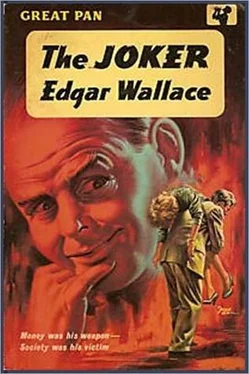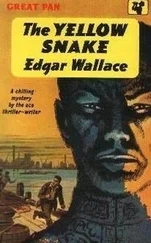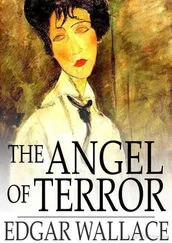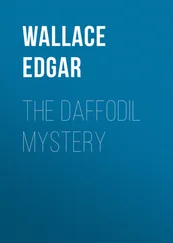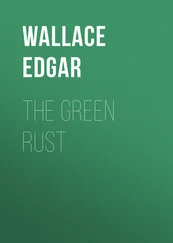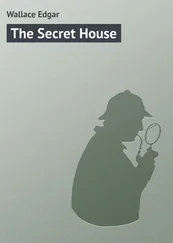Edgar Wallace - The Joker
Здесь есть возможность читать онлайн «Edgar Wallace - The Joker» весь текст электронной книги совершенно бесплатно (целиком полную версию без сокращений). В некоторых случаях можно слушать аудио, скачать через торрент в формате fb2 и присутствует краткое содержание. Год выпуска: 0101, Жанр: Старинная литература, на английском языке. Описание произведения, (предисловие) а так же отзывы посетителей доступны на портале библиотеки ЛибКат.
- Название:The Joker
- Автор:
- Жанр:
- Год:0101
- ISBN:нет данных
- Рейтинг книги:5 / 5. Голосов: 1
-
Избранное:Добавить в избранное
- Отзывы:
-
Ваша оценка:
- 100
- 1
- 2
- 3
- 4
- 5
The Joker: краткое содержание, описание и аннотация
Предлагаем к чтению аннотацию, описание, краткое содержание или предисловие (зависит от того, что написал сам автор книги «The Joker»). Если вы не нашли необходимую информацию о книге — напишите в комментариях, мы постараемся отыскать её.
The Joker — читать онлайн бесплатно полную книгу (весь текст) целиком
Ниже представлен текст книги, разбитый по страницам. Система сохранения места последней прочитанной страницы, позволяет с удобством читать онлайн бесплатно книгу «The Joker», без необходимости каждый раз заново искать на чём Вы остановились. Поставьте закладку, и сможете в любой момент перейти на страницу, на которой закончили чтение.
Интервал:
Закладка:
‘There is no truth whatever in the statement that a state of tension exists between our two countries. The Bonn incident has been from first to last regarded as trivial, and the speech of the British Foreign Minister can only have been made in a moment of regrettable mental aberration.’
For Jim the day’s interest had nothing whatever to do with stock exchanges or the fall of shares; nor yet the fortune which he knew was being gathered, with every minute that passed, by Harlow and his agents. His interest was solely devoted to the mystery of Sir Joseph Layton’s disappearance.
There had been present at Harlow’s reception a very large number of notable people, many of whom were personal friends of the missing Minister. They were emphatic in declaring that he had not returned to Park Lane; and they were as certain that Harlow had not left the house after Sir Joseph’s departure. More than this, there were two policemen on duty at the door; and they were equally certain that Sir Joseph had not returned. The suggestion was made that the Minister had gone to his country house in Cheshire, but when inquiry was set on foot it was learned that the house and the shooting had been rented by a rich American.
Immediately he had returned to London the Prime Minister flew to Paris. When he got back Jim saw him, and the chief officer of state was a greatly worried as well as a very tired man.
‘Sir Joseph Layton has to be found!’ he said, thumping his table. ‘I tell you this, Carlton, as I have told your superiors, that it was, impossible, unless Sir Joseph went mad, that he should have stood up in the House of Commons and said something which he knew to be absolutely untrue, and which he himself would repudiate! Have you seen this man Harlow?’
‘Yes, sir,’ said Jim.
‘Did he tell you what was discussed by any chance? Was it the so-called Bonn incident?’
‘Harlow says that they just talked about the Middle East and nothing else during the few minutes the Foreign Minister vas in his house. And really, sir, I don’t see how they could have had any very lengthy discussion; they were not together more than a few minutes. Apparently Sir Joseph went into a little room which Harlow uses for his more confidential interviews and drank a glass of wine. They then talked about the reception and Sir Joseph congratulated him on bringing the warring elements together. It seems to have been, according to Harlow’s account, the most uninteresting talk.’
The Prime Minister walked up and down the room with long strides, his chin on his chest.
‘I can’t understand it, I can’t understand it!’ he muttered. And then, abruptly: ‘Find Sir Joseph Layton.’ That terminated the interview for Jim.
He was rattled, badly rattled, and in his distraction he could think of only one sedative. He rang up Aileen Rivers at her office and asked her to come to tea with him at the Automobile Club.
Aileen realised from the first that Jim was directly occupied by a mystery that was puzzling not only the country but the whole of the civilised world. But she understood also the reason he had sent for her, and the thought that she as being of use to him was a very pleasant one.
As soon as he met her he plunged straight into the story of his trouble.
‘He may have been kidnapped, of course, and I should say it was very likely, though the distance between Palace Yard and Whitehall Gardens is very short; and Whitehall so full of police that it hardly seems possible. We have advertised for the taximan who drove him away from the House, but so far have had no reply.’
‘Perhaps the taximan was also kidnapped?’ she suggested.
‘Perhaps so,’ he admitted. ‘I do wish Foreign Ministers weren’t so godlike that they have to travel alone! If he’d only waited a few minutes I would have joined him.’ And then, with a smile: ‘I’m laying my burdens upon you and you’re wilting visibly.’
‘I’m not,’ she affirmed.
She considered a moment before she asked:
‘Could I not help you?’
He stared at her in amused wonder.
‘How on earth could you help me? I’m being rude I know, but I can’t exactly see—’
She was annoyed rather than hurt by his scepticism.
‘It may be a very presumptuous thing to offer assistance to the police,’ she said with a faint hint of sarcasm, ‘but I think what may be wrong with you now is that you want—what is the expression?—a new angle?’
‘I certainly want several new angles,’ he confessed ruefully.
‘Then I’ll start in to give you one. Have you seen my uncle?’
His jaw dropped. He had forgotten all about Arthur Ingle; and never once had he associated him with the Minister’s disappearance.
‘What a fool I am!’ he gasped.
She examined his face steadily, as though she were considering whether or not to agree. In reality her mind was very far away.
‘I only suggest my uncle because he called upon me this morning,’ she said. ‘At least, he was waiting for me when I came out to lunch. It is the first time I have seen him since the night he came back from Devonshire.’
‘What did he want to see you about?’
She laughed softly.
‘He came with a most extraordinary offer, that I should keep house for him. And really, he offered me considerably more than the salary I am getting from Stebbings, and said he had no objection to my working in the daytime.’
‘You refused, of course?’
‘I refused, of course,’ she repeated, ‘but he wasn’t at all put out. I’ve never seen him in such an amiable frame of mind.’
‘How does he look?’ asked Jim, remembering the unshaven face he had seen through the window.
‘Very smart,’ was the surprising reply. ‘He told me he had been amusing himself with some of the big films that had appeared since he went to prison. He had hired them and bought a small projector. He really was fond of the pictures, as I know,’ the girl went on, ‘but it seems a queer thing to I have shut oneself up for days just to watch films! And he asked after you.’ She nodded. ‘Why should he ask after you, you are going to say, and that is the question that occurred to me. But he seems to have taken for granted that I am a very close friend of yours. He asked who had introduced me, and I told him your wretched little car on the Thames Embankment!’
‘Speak well of the dead,’ said Jim soberly. ‘Lizzie has cracked a cylinder.’
‘And now,’ she said, ‘prepare for a great shock.’
‘I brace myself,’ said Jim.
‘He asked,’ the girl went on, a twinkle in her eyes, ‘whether I thought you would object to seeing him. I think he must have taken a sudden liking to you.’
‘I’ve never met the gentleman,’ said Jim, ‘but that is an omission which shall be rectified without delay. We’ll go round together! He will naturally jump at the conclusion that we’re an engaged couple, but if you can stand that slur on your intelligence—’
‘I will be brave,’ said Aileen.
Mr Arthur Ingle was only momentarily disconcerted by the appearance of his niece and the man who had filled his mind all that afternoon. Jim had met him once before, but only for a few seconds, when he had called to make an inquiry about Mrs Gibbins. Now he was almost jovial.
‘Where’s friend Elk?’ he asked, with a smile. ‘I understood you never moved without one another in these perilous times, when lunatic ministers are wandering about the country, and no man knows the hour or the day when he will be called up for active service! So you are Mr James Carlton!’
He opened a silver cigar-box and pushed it across to Jim, who made a careful selection.
‘Aileen told you I wanted to see you, I suppose? Well, I do. I’m a bit of a theorist, Mr Carlton, and I have an idea that my theory is right. I wonder if you would be interested to know what it is?’
Читать дальшеИнтервал:
Закладка:
Похожие книги на «The Joker»
Представляем Вашему вниманию похожие книги на «The Joker» списком для выбора. Мы отобрали схожую по названию и смыслу литературу в надежде предоставить читателям больше вариантов отыскать новые, интересные, ещё непрочитанные произведения.
Обсуждение, отзывы о книге «The Joker» и просто собственные мнения читателей. Оставьте ваши комментарии, напишите, что Вы думаете о произведении, его смысле или главных героях. Укажите что конкретно понравилось, а что нет, и почему Вы так считаете.
